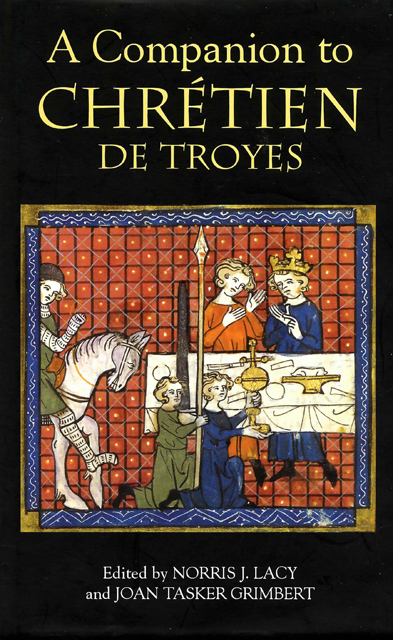7 - Editing Chrétien
Published online by Cambridge University Press: 23 March 2023
Summary
The works of Chrétien de Troyes have challenged editors for well over a century and a half, and the first to recognize the merit of medieval France's most famous romancier were not actually French. The honour of producing the first edition of any work by Chrétien belongs to a British woman: Lady Charlotte Guest, who produced, in 1838, The Mabinogion, Llyfr Coch o Hergest and Other Ancient Welsh Manuscripts; it contains a quite inaccurate transcription of Yvain taken from the manuscript Paris, B.N. fr. 12560. Shortly thereafter, in 1841, Adalbert Keller published fragments of Yvain and, three years later, of both Lancelot and Yvain.
The first French edition of Chrétien was Prosper Tarbé's Le Roman du chevalier de la Charrette. According to Alexandre Micha, Tarbé followed B.N. fr. 12560, believing it to be B.N. fr. 794 (hereinafter referred to as ‘Guiot’ from the name of the scribe). Soon afterward, Willem J.A. Jonckbloet published a further edition, which contains the Roman de Lancelot du Lac by Gauthier Map and a quite faithful rendering of the Guiot text, with some variants taken from Keller. The editio princeps of Erec et Enide was published by Immanuel Bekker using a transcription of B.N. fr. 1376 made by Francisque Michel.
Among Chrétien's five romances, Perceval has always represented the greatest editorial challenge. This immensely popular romance, left unfinished by Chrétien, has come to us preserved in more numerous and divergent manuscripts than the other romances. In more than half of them, Perceval le Vieil (i.e., Chrétien's romance) is followed consecutively by the Continuations of Perceval. The first editor was Charles Potvin, who published the initial volume in 1866. The whole of vol. 2 (1866) and the beginning of vol. 3 (1868) contain Perceval le Vieil, ending with vs. 10,601. The editor used chiefly the manuscript Mons, Bibliothèque Universitaire 331/206.
Potvin's Perceval marks the end of what could well be called the ‘early’ period of editorial activities. It was characterized by a virtual absence of discussions pertaining to the theory and practice of the editorial craft.
Although it was published a little before Potvin, Wilhelm Ludwig Holland's edition of Yvain could be considered as the first satisfactory modern edition of Chrétien.
- Type
- Chapter
- Information
- A Companion to Chrétien de Troyes , pp. 76 - 84Publisher: Boydell & BrewerPrint publication year: 2005

